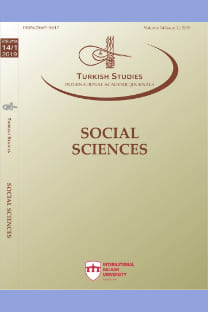Empedokles Felsefesinin Kökenleri
The Origins of The Empedocles Philosophy
___
- Aristoteles, (1996). Metafizik. (çev. Ahmet Arslan), Sosyal Yayınları.
- Anonim.(2008). Homeros ilahileri. (çev: Ayşen Eti Sina). Arkeoloji ve Sanat Yayınları.
- Arda, Z., Şahin, H., Büyükkol, S. (2013). İlkçağdan modernizme; bilim, sanat ve felsefe buluşmaları. c.2, s. 3. Journal of Research in Education and Teaching.
- Balkaya, A. (2012). Kozmogeni anlatılarında dikotomik akgının nedenselliği,Turkish Studies, 7/4, 987-994. http://dx.doi.org/10.7827/TurkishStudies.3900
- Bernal, M. (1998). Kara Athena: eski Yunan uydurmacası nasıl imal edildi? 1785-1985.Kaynak Yayınları.
- Berthelot, M. (1885). Les origenes de l’alchimie.
- Betz, H. D. (1980). Fragments from a catabasis ritual in a Greek magical papyrus.History of Religions,19(4), 287-295.https://doi.org/10.1086/462853
- Bidez, J. (1894).La biographie d'Empédocle. (Vol. 12). Georg Olms Verlag.
- Bidez, J., & Cumont, F. (1938).Les mages hellénisés: Zoroastre: Ostanès et hystaspe. Les Belles Lettres.
- Bolay, S. H. (2004). Felsefeye giriş.Akçağ Yayınları.
- Brunner, H. (1957).The new aspect of ancient Egypt. Universitas 1:3.267-296.
- Burkert, W. (1969). Das proömium des parmenides und die katabasis des pythagoras.Phronesis,14, 1.
- Burnet, J. (2013). Erken Yunan felsefesi. (çev. Aziz Yardımlı). İdea.
- Campailli, S. (1987). La leggenda di Empedocle. Filologa e forme letterarie.s. Abt. 1, Della Corte.
- Cornford, F. M. (1952). Principium sapientiae: A study of the origins of Greek philosophical thought. Cambridge University Press.
- Erdem, Z. (2004). Antik çağ mitoslarında ölüm ve yeniden doğuş inancı.Sanat ve İnanç/1.MGSÜ-TSTUAM Yayınları.275-285.
- Erhat, A. (2000). Mitoloji sözlüğü.Remzi Kitabevi.
- Baydur, N.. (2004). IAO. VII. Tüba-Ar.189-196. http://dx.doi.org/10.22520/tubaar.2004.0015
- Buresch, K. (1889).Klaros, untersuchungen zum orakelwesen des späteren altertums. Aalen: Scientia-Verlag.
- Freeman, K. (1957). Ancilla to the Pre-Socratic Philosophers:A complete translation of the fragments in Deils,Fragmente der Vorsokratiker.Harvard University Press.
- Graf, F. (1974). Eleusis und die orphische Dichtung Anthens in vorhellenstischer Zeit.Illinois Classical Studies.
- Groningen, B.A. van(1956). Le fragment 111 d’Empédocle.Classica et mediaevalia,17, 47-61.
- Guthrie, W. K. C. (1999). İlkçağ felsefesi tarihi.Gündoğan Yayınları.
- Guthrie, W. K. C. (2011). Yunan felsefe tarihi. Sokrates öncesi ilk filozoflar ve pythagorasçılar.Kabalcı Yayınevi.
- Heidel, W. A. (1912). “On anaximander”. Classical philology.The Universitiy of Chicago Press.Vol. 7. 212-234.
- Heidel, W. A. (1913). On certain fragments of the presocratics.Proceedings of the American Academy, 48. 681-734.
- Herodotos. (2016). Tarih.(çev. Müntekim Ökmen), (12. Baskı). Türkiye İş Bankası Yayınları.Hornung, E. Mısır Tarihi.(çev. Zehra Aksu Yılmazer). Kabalcı Yayınevi.
- Işık, İ (2020). Marsyas Mitolojisinde Tanrılar Savaşı. Journal of History School, 47, 2964-2988.http://dx.doi.org/10.29228/joh.44439
- Johnston, S. I. (1990).Hekate Soteira: a study of Hekate's roles in the Chaldean oracles and related literature. Scholars Press.
- Kingsley, P. (1994). Greeks, shamans and magi.Studia iranica.23(2), 187-198.
- Kingsley, P. (2002). Antik felsefe gizem ve büyü. “Pythagoras ve Empedokles Geleneği”,Kabalcı Yayınevi
- Kranz, W. (1984). Antik felsefe metinler ve açıklamalar.(çev. Suad Y. Baydur).Sosyal Yayınları.
- Lauer, J. P. (1960). Observations sur les pyramides.Bibliothèque d'étude.
- Lippman, E. A. (1964).Musical thought in ancient Greece. Columbia University Press.
- Long, H. S. (1948). A Study of the Doctrine of Metempsychosis in Greece from Pythagoras form Plato.Unpublished doctoral dissertation, Princeton University.
- Mansel, A. M. (1999). Ege ve Yunan tarihi. Türk Tarih Kurumu Basımevi.
- Platon (1963). Phaidon, (çev. S. K. Yetkin ve H. R. Atademir, Çev.). Ankara Üniversitesi.
- Richardson, N. J. (1974).The Homeric hymn to demeter. Oxford University Press.
- Sá, L. F. F. (2005).The myth of orpheus in Milton's L'allegro, Il penseroso, and lycidas. Faculdade de Letras/UFMG.
- Snodgrass, A. M. (1971).The dark age of Greece: an archaeological survey of the eleventh to the eighth centuries BC. Edinburg Universitiy Press.
- Thomas, H. W. (1938).Epekeina: untersuchungen über das überlieferungsgut in den jenseitsmythen Platons.
- Vlastos, G. (1947). Equality and justice in the early Greek cosmogonies.Classical philology. The Universitiy of Chicago Press.
- West, M. L. (1966). Hesiod: Theogony,Oxford Research Encyclopedia of Classics.
- Wilamowitz-Moellendorff, U. V. (1931). Der Glaube der Hellenen,2.Weidmannsche Buchhandlung.
- Wright, M. R. (1981). Empedocles: the extant fragments,Yale University Press.
- Zhmud, L. J. (1989). "All is number"?.Phronesis,34(1-3).Brill.270-292.https://doi.org/10.1163/156852889X00189
- Zuntz, G. (1971). Persephone: Three essays on religion and thought in Magna Graecia.Oxford Clarendon Press.
- ISSN: 2667-5617
- Yayın Aralığı: Yılda 6 Sayı
- Başlangıç: 2006
- Yayıncı: ASOS Eğitim Bilişim Danışmanlık Otomasyon Yayıncılık Reklam Sanayi ve Ticaret LTD ŞTİ
Digital Transformation in Museum Management: The Usage of Information and Communication Technologies
Bir Dönüşüm Dinamiği OlarakPetrolün Bakü Şehir Kimliğine ve Şehirleşmesine Etkisi
Güneydoğu Anadolu Bölgesinde Kuraklık, Çölleşme ve Tarımsal Ürün Verimi Arasındaki İlişkiler
Antrenör Adaylarının Genel Öz Yeterlilik ve İletişim Düzeyleri Arasındaki İlişkinin İncelenmesi
Avrasyacılık-Batıcılık İkilemi Çerçevesinde Ermenistan Siyasetine Analitik Bir Bakış
Tüketicilerin Borca Karşı Tutumları ve Tutumluluk Eğilimleri Üzerinde Kişilik Özelliklerinin Etkisi
Türkiye’de Global Bütçe Uygulamasının Hastane Seçme Hakkına
Uşak’ın Sahip Olduğu Değerler Açısından Şehir İmajı Algı Düzeyleri Üzerine Bir Saha Araştırması
Eleştirel Kent Sosyolojisi: Kuzey Amerika’da Syracuse Kentinin Dışlayıcı Pratikleri
